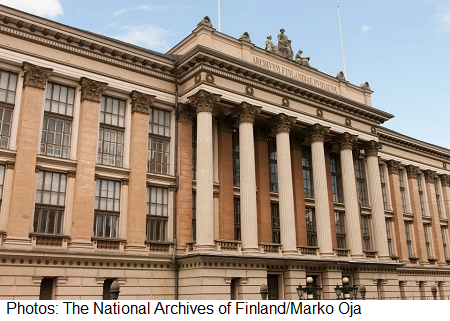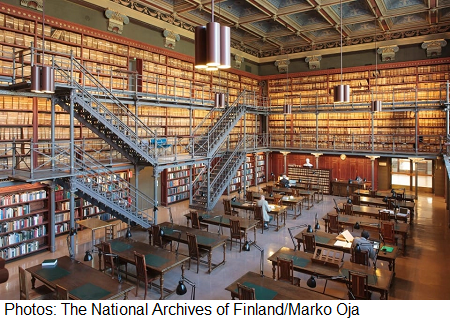
The CODATA-Helsinki Workshop on FAIR RDM in Institutions will take place at the National Archives of Finland on 20-21 October 2019. It is a collocated event before the 14th RDA Plenary Meeting, Helsinki, Finland.
The organisers and programme committee invites presentations and posters for this workshop: https://conference.codata.org/Helsinki-CODATA-2019/submit/
The deadline for proposals is Friday 6 September. Given the relatively short time before the event, there will not be an extension. We aim to notify accepted speakers by Friday 13 September.
Research Data and Research Institutions
 Research data are an asset for research institutions. Their creation, management and stewardship imposes considerable responsibilities and requires partnership and alignment with other institutions and research initiatives globally. All over the world universities and libraries have started the task of developing research data services, many aspiring to cover the entire research lifecycle: support in writing proposals and data management plans, repository infrastructures for the storage of data, support in publishing data, assignment of persistent identifiers, lecturing in data management, etc. This broad scope means that such services are often seen as requiring a joint effort from university, library, IT centre, faculties and other stakeholders.
Research data are an asset for research institutions. Their creation, management and stewardship imposes considerable responsibilities and requires partnership and alignment with other institutions and research initiatives globally. All over the world universities and libraries have started the task of developing research data services, many aspiring to cover the entire research lifecycle: support in writing proposals and data management plans, repository infrastructures for the storage of data, support in publishing data, assignment of persistent identifiers, lecturing in data management, etc. This broad scope means that such services are often seen as requiring a joint effort from university, library, IT centre, faculties and other stakeholders.
FAIR Research Data Management involves robust planning, policies, infrastructure, training and support. Institutes that produce and consume data are required to ensure seamless accessibility to data and ensure practices that foster its reuse. Often institutes are less aware of existing good practices and progress in implementing Institutional Research Data Management. Improved awareness and knowledge sharing can help reduce duplication in initiatives, and avoid redundant and inefficient practices at various points in the data lifecycle. There is a widely recognised need to assist knowledge sharing between institutions and to do this in an increasingly structured way, by using (and where necessary refining) maturity models such as the DCC RISE. Equally, effective knowledge sharing can help reduce the gap between rich and poor institutions and between universities or research organisations in economically advantaged and disadvantaged contexts. Effective RDM practices can also make the process for sharing and reusing data more streamlined and efficient, thereby enabling research to be more efficient and driving greater impacts to be achieved out of research.
It is timely for actors in the various dimensions of such initiatives internationally to share their practical experiences, research and insights.
Themes
In principle, all topics around RDM initiatives in research institutions are in scope. For the the Helsinki-CODATA Workshop we are particularly interested in the following themes:
-
Papers exploring initiatives to benchmark and to measure maturity of institutional RDM provision. How are services being defined and scoped, and what is their commonality across institutions? What are the metrics and indicators of effective RDM provision, what are the KPIs being used? How are institutions prioritising their development of services?
-
Papers describing holistic strategies to develop and implement RDM services. What is the overall approach being taken by the institution and how is this communicated in the strategy? How is the case made with senior management? How is the development and the service funded? What is the business model? What are the key components and activities? What prioritisation is being used?
-
The role of FAIR services in institutional provision: how are institutions responding to FAIR and the agenda set by the FAIR principles, the European Open Science Cloud, the expert group report on Turning FAIR into reality https://doi.org/10.2777/1524 and other equivalent developments in different geographies?
We invite also shorter papers on a range of RDM topics, including but not limited to:
-
Skills and training: what, for whom and why? How have you integrated skills and training in the total RDM services provision?
-
Technical service provision: in house, shared, open source or outsourced? How are the technical services integrated in the total RDM services provision?
-
Champions and engagement: How is the RDM service engaging with researchers and particular communities? How are researchers involved in the development of services? What role do champions and advocates play in this and how? What has been the role of the PVC / vice-rector for research etc? What other possible champions have been identified and how? What lessons have been learnt from engagement with research groups, departments, projects…?
-
Sustainability: What business models are being developed for the RDM services? How is the service being financed? How does the institution plan to ensure the sustainability of the service and the long term stewardship of the data? How is it ensured that the services are actually found and used by users?
-
Technical innovations: forum for technical discussions and any new and emerging technical developments? How can technical innovations play a role in bridging the gaps between separate services in the total RDM service provision?
-
User experiences: use cases in RDM through the RDM lifecycle: sharing user experiences and case studies. What lessons can be learned from these use cases for setting up an end-to-end set of RDM services?
-
Collaboration for service development: What local, national or international partnerships are there for the development of services and what are the benefits? What appraisal has been done of such collaborations? What benefits have been identified?
After the workshop, selected presenters will be invited to submit a full paper to the CODATA Data Science Journal where they will form a special collection.
The proposed workshop builds on two previous collocated events, the Göttingen-CODATA RDM Symposium (150 attendees) and the Drexel-CODATA FAIR-RRDM Workshop (130 attendees). Papers from the Göttingen event are now appearing in a Special Collection of the CODATA Data Science Journal.
Guidelines for Proposals
Proposals for presentations should be submitted to an appropriate thematic session corresponding to the theme of the proposal.
Recommended proposal lengths are:
Long, research presentation, addressing the workshop themes by reporting on original research: 600-800 words
Short, practice presentation, addressing the workshop themes by reporting on a project or institutional activity: 400-600 words
Posters and lightning talks addressing the workshop themes: 300-400 words
Workshop
An important part of this event will be a workshop looking in detail at issues around benchmarking institutional provision of RDM services. More information to follow…
Keynotes
The event will feature at least two keynote talks on important issues for RDM in institutions. Details to follow…
Registration
The registration site will appear soon!
Programme Committee
- Jan Brase, University of Göttingen
- Mercè Crosas, Harvard University
- Claudia Engelhardt, University of Göttingen
- Jane Greenberg, Drexel University
- Heidi Laine, CSC
- Liu Chuang, Institute of Geography, Chinese Academy of Science
- Devika Madalli, Indian Statistical Institute
- Pekka Orponen, Aalto University
- Limor Peer, Yale University
- Jan Lucas van der Ploeg, University Medical Center Groningen
- Robin Rice, University of Edinburgh
- Annette Strauch, University of Hildesheim
- Minglu Wang, York University
- James Wilson, UCL
- Keith Russell, ARDC
- Michael Witt, Purdue University
